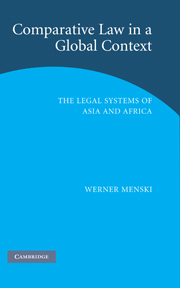Book contents
- Frontmatter
- Contents
- Preface and acknowledgments
- Table of cases
- Table of statutes
- List of abbreviations
- PART I Comparative framework
- PART II Regional comparisons in a global context
- Introduction
- 4 Hindu law: the search for appropriateness
- 5 Islamic law: God's law or men's law?
- 6 African laws: the search for law
- 7 Chinese law: code and conduct
- Conclusion: towards global legal realism
- References
- Index
5 - Islamic law: God's law or men's law?
Published online by Cambridge University Press: 09 November 2009
- Frontmatter
- Contents
- Preface and acknowledgments
- Table of cases
- Table of statutes
- List of abbreviations
- PART I Comparative framework
- PART II Regional comparisons in a global context
- Introduction
- 4 Hindu law: the search for appropriateness
- 5 Islamic law: God's law or men's law?
- 6 African laws: the search for law
- 7 Chinese law: code and conduct
- Conclusion: towards global legal realism
- References
- Index
Summary
The present chapter aims to provide a detailed historical overview of Islamic law in comparative perspective. It seeks to demonstrate that Islamic law, too, is built on a notion of plurality-consciousness and can be examined within the triangular model of global legal theory explored in the present study. In comparison with Hindu law, scholarship on Islamic law seems to be much more securely anchored around the world. This does not mean that knowledge about Islamic law is better developed or that its place within a plurality-focused global analysis is easier to define. Scholarship on Islamic law is spread widely, available in many different languages apart from Arabic and English, and so diffuse in terms of approaches, sectarian and school traditions that a full overview is impossible. The present analysis concentrates on those aspects that further understanding of how Islamic law, as a religion-based legal system, manages to reconcile the doctrinal centrality of religious belief with its inherent plurality of socio-cultural manifestations. It is a case study mainly in how natural law and socio-legal approaches interact, while concepts of state positivism are not absent. This chapter highlights how Islamic law has achieved and largely maintained a sophisticated degree of plurality-consciousness, albeit often obfuscated by theological polemics and political rhetoric.
The chapter explores in depth the tensions within Islamic law concerning its claims to uniformity and global validity and the pluralities created by human social and political life.
- Type
- Chapter
- Information
- Comparative Law in a Global ContextThe Legal Systems of Asia and Africa, pp. 279 - 379Publisher: Cambridge University PressPrint publication year: 2006
- 2
- Cited by

